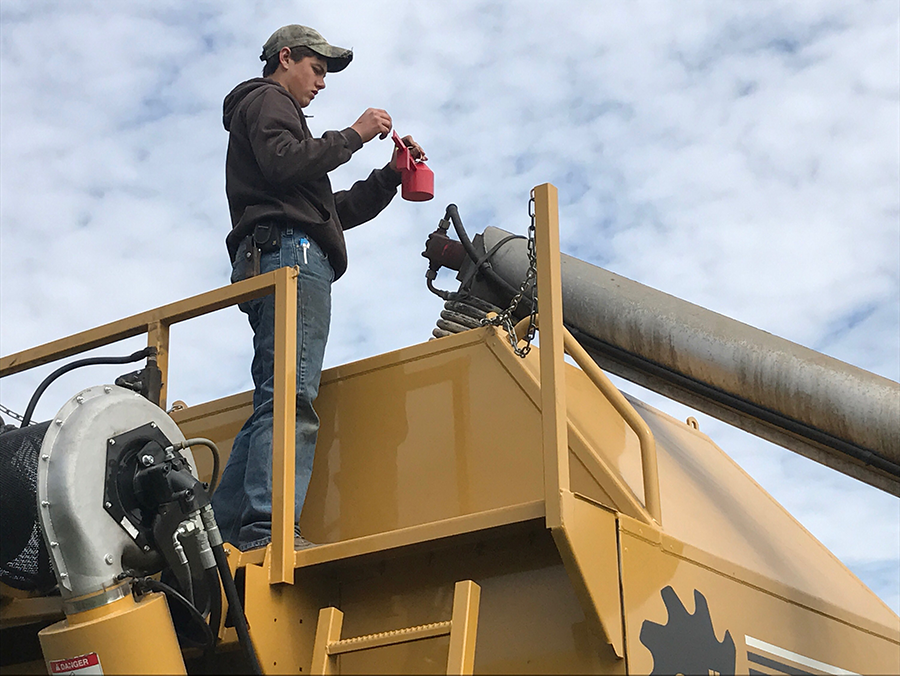Pictured Above: Ryberg Farms — Chris Leske (SoilWarrior operator), Brian Ryberg & Jason Anderson.
Purchasing new farm equipment takes time and consideration. Equally important is finding an operator for your new piece of equipment. At Environmental Tillage Systems (ETS), our customers often tell us one key to their success is having a skilled operator for their SoilWarrior strip-till and nutrient placement equipment.
Two SoilWarrior operators, Chris Leske, and Brayden Schultz (pictured bellow), shared some insight on what makes a good strip-till operator.

Leske works and operates a SoilWarrior on Ryberg Farms in Buffalo Lake, Minn. He is the lead SoilWarrior operator on the farm. Ryberg Farms runs 3,000 acres of corn, soybeans and sugarbeets and operates a 4544SXD SoilWarrior, a 24-row, 22-inch machine with X row units for fall strip-tillage and nutrient placement.
Schultz is from Wells, Minn. He and his father, Jeff, raise hogs and run 870 acres of corn, soybeans and oats and operate a 3120SXD SoilWarrior, an 8-row, 30-inch machine with X row units. The Schultz family have completed their strip-tillage in both the fall and spring in the past. They now do just fall strip-tillage and nutrient placement with the SoilWarrior.
Strip-Till Farmer's Building Healthier Soil and Profits with Strip-Till series is brought to you by Environmental Tillage Systems.
At Environmental Tillage Systems, we believe farmers shouldn’t have to choose between doing what’s right for your soil and what’s right for your business. The SoilWarrior is a complete precision zone tillage system custom built for your farm and delivered to you ready to get in the field. Backed by 24-hour service and support, The SoilWarrior takes the guess work out of strip-till so you can concentrate on defending the land and leading the charge. See soilwarrior.com for more information.
1. Attention to Detail
Successful strip-till equipment operators are always paying attention to all settings and parts of the machine. They will notice if something is wrong and will be able to fix it on their own or know who to ask. “Become familiar with the machine, how it functions, where everything is at,” Schultz says. “Get familiar so you know how to adapt and overcome changes.” He worked hard to learn and understand technology and parts.
2. Continuous Learner
Operating new equipment comes with a learning curve. Trial and error is key to identifying what works best in your soil conditions, with your machine, and the technology you use. Both Leske and Schultz mentioned that the way they learned how to operate their SoilWarrior was through “trial and error.” For Leske, experimentation ranged from speed and depth to fertilizer and application. “You never know if something will work out unless you try it.”
3. Planner
There is only a small window of time in either the fall or spring to complete all the work you need to get done. It is important for owners and operators to have their machines prepped and ready to go whether this means greasing, fixing parts or just figuring out a game plan. Operators who plan and think ahead will likely have fewer issues to face during “go time.” Many successful operators also do this preparation work themselves or oversee it.
4. Self- Motivated
Another characteristic of a successful operator is to be self-motivated. There is never enough time in any season to get everything done. If an operator is not self-motivated, it can take up the time of the owner or other employees to continuously be checking in on the operator. “I want an operator who isn’t afraid to get out and look, someone who isn’t just the driver,” Schultz says. If the operator is dedicated to doing the best job everyone will benefit from it. “You're setting your planter up for success. Think about it in the same way the guy running the planter would.”
5. Passionate
Top operators enjoy their time running strip-till equipment. “I enjoy it because it is something different to the area. Every farmer operates a combine, but this is different,” Leske says. Many operators value their role and want their work to create the best seedbed in order to grow the best crop. A top operator also trusts the process. “I have confidence in the machine,” Schultz says. “I know it will go through the various soil types and conditions (that I run it in).”
Finally, it all comes down to being confident in your purchase. You chose your equipment for specific reasons; trust it will work for you and your operation. “Glad we went the route in purchasing the (Soil)Warrior, it is an easier machine since it is all in one. Doesn’t have a cart and a long train. It is all contained and easy to maneuver,” Leske says.







